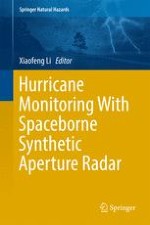2017 | OriginalPaper | Chapter
12. Sea-Level Pressure Retrieval from SAR Images of Tropical Cyclones
Author : Ralph Foster
Published in: Hurricane Monitoring With Spaceborne Synthetic Aperture Radar
Publisher: Springer Singapore
Activate our intelligent search to find suitable subject content or patents.
Select sections of text to find matching patents with Artificial Intelligence. powered by
Select sections of text to find additional relevant content using AI-assisted search. powered by
